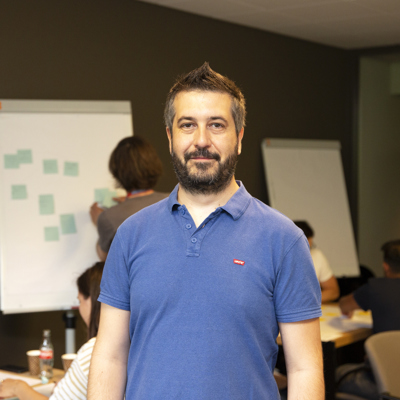- Speakers
João Rosa and Sarah Wells


- Date
- May 29
- Description
The principles of fast flow underlying the ideas in Team Topologies are unfamiliar to people in many organizations. Decades of treating IT like a cost center have left execs and management with incomplete awareness of the benefits of parallel exploration, autonomous teams, ubiquitous APIs, and ongoing exploration of team and system boundaries.
This Masterclass provides practical techniques that help to demonstrate and embed fast flow approaches within an organization, thereby accelerating the adoption of fast flow and Team Topologies. Attendees will be better able to explain and demonstrate tools and techniques from Team Topologies and place these in context for meaningful organizational change.
What you will learn
Deep insights into fast flow and Team Topologies. Hands-on experience of tools and techniques, guided by a Conflux practitioner. Confidence in explaining the nuances of fast flow and Team Topologies. Use the Team Topologies modeling shapes to explore organization dynamics. Gain advanced awareness of platform dynamics for fast flow. Begin to facilitate an Independent Service Heuristics session within your organization. Map some fast flow skills pathways for your organization.
Who should attend?
This Masterclass is for leaders, managers, change agents, members of Enabling teams, Agile Coaches, architects, senior engineers, UX/UI and product managers, or any other decision-makers involved in building and running software services.
The Masterclass is aimed at organizations looking to use fast flow as a driver to gain a competitive advantage and/or improved outcomes for users and customers. We recommend that attendees read the book Team Topologies before attending in order to get the best out of the Masterclass.
Agenda
Part 1: The importance of the evolution of team interactions and team boundaries:
We begin by revisiting Chapters 7 and 8 of the Team Topologies (TT) book and the implications of the team interaction modes, how the Team API can help cross-team communication, and the importance of organizational sensing. We then use the open-access TT team modeling shapes to become familiar with thinking in terms of the evolution of teams and interactions, not simply a target design. We finish Part 1 by a group critique of some team interaction diagrams based on different industry contexts to help embed the learning.
Part 2: Success with platforms and platform thinking for fast flow:
We begin by reviewing the purpose of a platform from a TT perspective and establish some useful metrics and attitudes for platform success. We take a deep dive into the implications of “fractal” (self-similar, nested) platforms as defined by TT. We then explore some advanced patterns for platforms around multiple parallel product/service offerings, sharing or “harvesting” proven solutions, horizon scanning using Core Domain Charts, data consumption (touching on techniques like Data Mesh) and product composition. We finish Part 2 by looking at an emerging approach that we call Desynchronous that helps organizations to scale without the slow-downs associated with large internal platforms of the past.
Part 3: Finding good boundaries for flow using Independent Service Heuristics:
We begin by reviewing the fracture planes for fast flow from Chapter 6 of TT and the pros and cons of different fracture planes in a fast flow context. We then take a deep dive into the use of Independent Service Heuristics (ISH) as a technique for finding good boundaries for fast flow. We finish Part 3 by exploring how to use ISH and how to facilitate discovery sessions using ISH and related techniques.
Part 4: Skills paths and aptitudes for fast flow + wrap-up:
We begin by exploring the skills pathways needed for typical roles in IT and software delivery when embarking on a fast flow transition. We then discuss challenges and opportunities around skills gaps and aptitudes and how we can use market sensing techniques to help avoid skills stagnation. We finish Part 4 by reviewing the success patterns covered throughout the Masterclass and answering any remaining questions.
Prerequisites
Requirements and Skill level
Attendees will need to bring a laptop with a fast network connection and a modern web browser installed (Chrome, Firefox, or Safari preferred). Before the Masterclass you should visit this page to test that your laptop and browser work well with Miro, the digital whiteboard tool used in both the in-person and online versions of the Masterclass.
Attendees will get the most benefit from the workshop by completing the prerequisite activities. The ‘Essential’ activities will only take around 20 minutes to complete. The ‘Recommended’ activities may take 40 minutes to complete in total but will enable a deeper, more valuable learning experience.
Essential Requirements
Read the infographics - 5 minutes Read the article “Forget monoliths vs. microservices. Cognitive load is what matters.” - 7 minutes Read the article “5 reasons why CI/CD is vital to your organization's value stream” - 7 minutes We use Miro for our online workshops. If you’re not already familiar with using Miro, you can quickly learn the basics with this short course from Miro
Recommended Requirements
Read the book Team Topologies by Matthew Skelton and Manuel Pais. Read these slides - 10 minutes Read these slides - 10 minutes Watch the talk Beyond the Spotify Model: using Team Topologies for fast Flow and Organisation Evolution - 20 minutes at 1.5x speed
About João Rosa
João Rosa is an Associate Principal at Conflux. He has experience enabling organizations to transition to fast-flow operating models. As interim CTO with scale-ups or as a consultant, he supported firms with different structures based on fast-flow and Team Topologies principles. He focused on bridging strategy to execution in areas such as alternative funding models or effective use of technology, where teams and organizations can thrive in a complex world.
He is a Team Topologies Valued Practitioner. He is also one of the authors of the book Software Architecture Metrics, the curator of the book Visual Collaboration Tools and the host of the Software Crafts Podcast.
You can find him travelling with his daughter and wife or lying on the beach reading a book when he is not on his duties. João is an amateur cook in his remaining time.
About Sarah Wells
Sarah Wells is an Associate Principal at Conflux. She is an experienced technology leader, consultant and conference speaker with a focus on microservices, engineering enablement and technology strategy. She has over 20 years experience as a developer, principal engineer and tech director across product, platform, SRE and devops teams.
She spent over a decade at the Financial Times, leading as it transformed into a true cloud native organization, releasing code 250 times as often and embracing autonomous empowered teams. The FT were early adopters of microservices, containers, kubernetes and engineering enablement and Sarah is currently writing a book about Enabling Microservice Success for O’Reilly that captures what she learned during this transformation about how to be effective with this style of architecture: it requires facing up to technical, organizational and cultural challenges.
Sarah is a strong believer in autonomous, empowered teams but has also had to run operational support across the whole of the FT so is an advocate for platform engineering and building a paved road to production.
Sarah frequently speaks at conferences and is on the program committee for QCon London.